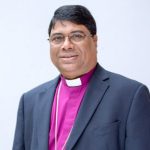Op-Ed: The Stabbing of Salman Rushdie Was an Attack on Us All
After living in secret since 1989, it was in the safety and freedom of the United States that Salman Rushdie was attacked with a knife by a religious zealot.
The brutal stabbing shows that extremists’ plans can succeed despite stringent state-imposed restrictions designed to stop such perpetrators. It also underscores the near-universal pressure in the modern era to curb freedom of speech.
Rushdie was the greatest living Indian-born English novelist when Ayatollah Khomeini offered a $3 million bounty and issued a fatwa calling for Rushdie’s assassination over his novel “The Satanic Verses.” Rushdie went into hiding and, even with high security, almost lost his life when he was stabbed in front of a New York audience gathered to hear him speak last month.
The Rushdie attack illustrates the disregard held by certain societies for the fundamental human right of free speech. It also reveals the cowardice of politicians who want to be politically correct rather than principled on an important human rights issue.
The free world has capitulated to religious extremists on issues of religion and faith and remains silent when books, films or art are banned under the guise of respecting someone’s religious or cultural sentiments.
Islamic nations have been largely silent on the fatwa against Rushdie. Instead, extremists in those nations have threatened anyone who speaks against the attack.
The encouraging exception is Muhammed Al Issa, secretary general of the Muslim World League based in Mecca, who spoke up quickly and forcefully, condemning the attempt on Rushdie’s life. Al Issa said the violent attack was “a crime that Islam does not accept.” His comments on the subject reflect great courage and he deserves the respect and admiration of the free world.
In India, where I live, the political classes of the right and left are deadly silent on the issue. A previous Indian government even sided with religious extremists to prevent Rushdie from attending a literary festival here. In a welcome move, the present Indian government has condemned the attack on Rushdie and extremist violence.
But the advances the world has made on free speech seem to be eroding in the 21st century. In India, religious extremists file cases against journalists for hurting their sentiments, and courts imprison them. In the U.S., the “woke” culture attacks anyone with a different point of view.
The question is, should free speech as a fundamental right matter to societies and nations in the present day? The unambiguous answer must be yes, given the fact that without the free flow of ideas human civilization cannot progress.
To be human is to be able to think and speak. Descartes said, “I think, therefore I am.” The corollary to this axiom is “I speak, therefore I am human.”
Our tolerance of attacks on free speech in recent decades has left us with increasing violence in open societies. In an interconnected world, we cannot ignore an attack on free speech as a problem isolated in certain pockets of the world.
The fatwa was an Iranian problem and we assumed it would stay there. But it came to America. The silence of major democracies in the face of attacks on free speech, creative work and journalists needs to be called out.
The allegation against Rushdie was that he had defamed Islam and insulted Muhammad. Islamic thinkers need to debate among themselves the issue of the criticism of Islam and its founders. There has been freedom in the modern period to criticize Christianity and its founders. The same would apply to criticism of other faiths like Hinduism.
In fact, people of faith need to listen to the criticisms of thinkers like Richard Dawkins and Christopher Hitchens, who have written extensively about the shortcomings of religions and how harm has resulted when religious extremism has led to violence.
Where would the world be today if the freedom to think and speak had been snuffed out in centuries past? What kind of societies would we have? Where would science be if it had not questioned deeply held views of the natural world? Where would Western civilization be if the Christian view had not been adopted that humans are created in the image of God and therefore free to speak and communicate?
We must speak, even if it means that some deeply held religious views are challenged.
The attack on Salman Rushdie is not a Muslim problem. It is an attack on each one of us.
The views expressed in this opinion article are those of their author and are not necessarily either shared or endorsed by the owners of this website. If you are interested in contributing an Op-Ed to The Western Journal, you can learn about our submission guidelines and process here.
Truth and Accuracy
We are committed to truth and accuracy in all of our journalism. Read our editorial standards.
Advertise with The Western Journal and reach millions of highly engaged readers, while supporting our work. Advertise Today.












